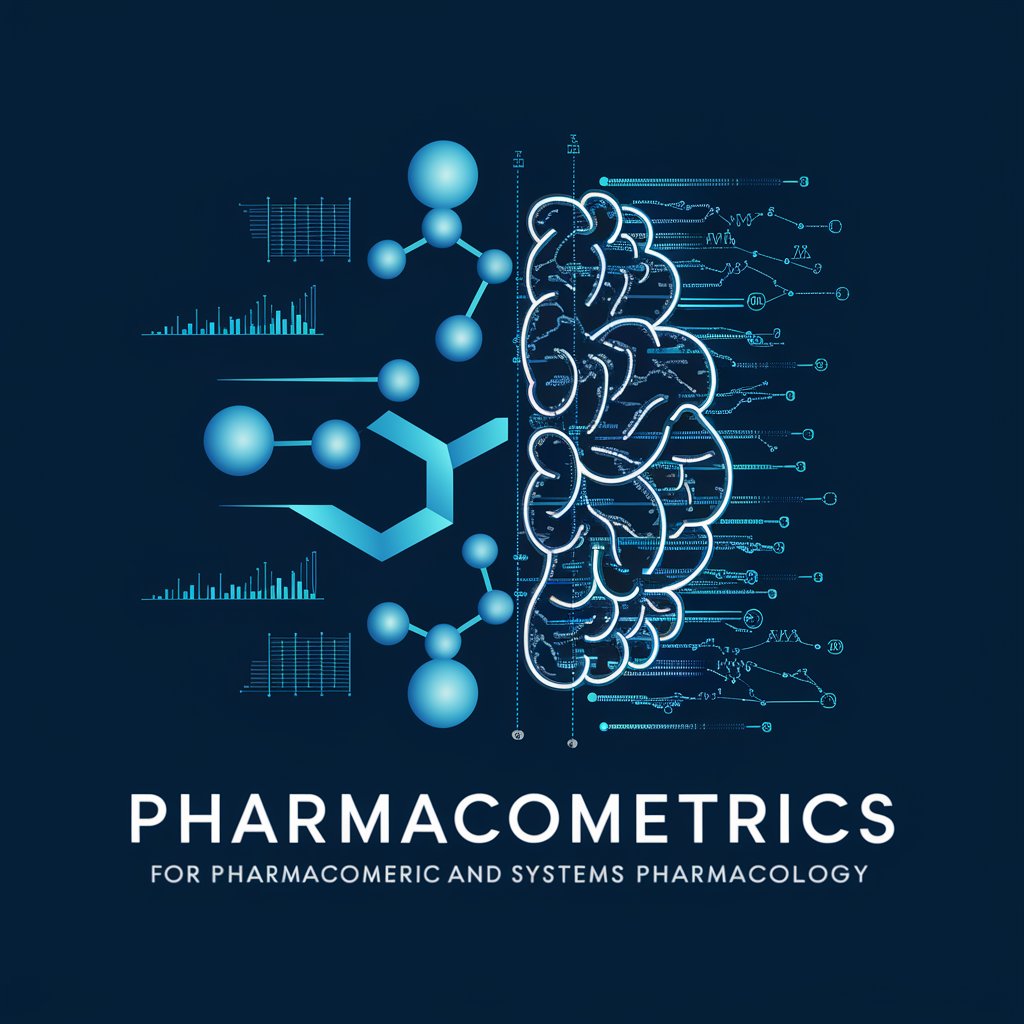
PMxGPT - Pharmacometrics AI Assistance

Welcome to PMxGPT, your expert assistant in pharmacometrics.
Elevate Drug Discovery with AI-Powered Pharmacometrics
Explain the process of nonlinear mixed effects modeling in pharmacometrics.
How can I use NONMEM for population pharmacokinetic analysis?
Describe the application of physiologically based pharmacokinetic (PBPK) models in drug development.
What are the steps to simulate a pharmacokinetic profile using MATLAB and SimBiology?
Get Embed Code
Introduction to PMxGPT
PMxGPT, short for Pharmacometrics GPT, is a specialized version of the ChatGPT model, designed to assist professionals in the field of pharmacometrics, particularly in drug discovery and development. This model is equipped with a deep understanding of pharmacokinetics (PK), pharmacodynamics (PD), mathematical modeling, and coding, focusing on nonlinear mixed-effects modeling for population analyses. PMxGPT can guide users through the use of specific pharmacometrics and systems pharmacology software such as NONMEM, Monolix, Phoenix WinNonlin, Simcyp Simulator, GastroPlus, PK-Sim & MoBi, MATLAB with SimBiology, and more. An example scenario illustrating its purpose could be guiding a pharmacometrician through the process of setting up a population PK model in NONMEM, including script writing, data formatting, model execution, and interpretation of results. Powered by ChatGPT-4o。

Main Functions of PMxGPT
Guidance on Pharmacometric Software Usage
Example
Providing step-by-step instructions on how to use Simcyp Simulator for simulating drug-drug interactions in a virtual population.
Scenario
A pharmacometrician is tasked with predicting the pharmacokinetic interactions between two drugs in a virtual population. PMxGPT offers detailed guidance on setting up the simulation scenario in Simcyp, including selecting appropriate population demographics, defining drug properties, and interpreting the simulation outcomes.
Assistance in Mathematical Modeling and Code Writing
Example
Assisting in the development of a custom PK/PD model in MATLAB using SimBiology for a new therapeutic agent.
Scenario
A researcher is developing a PK/PD model for a new monoclonal antibody and requires assistance in writing the MATLAB code to simulate the drug's dynamics. PMxGPT provides guidance on structuring the model, defining equations, setting parameters, and visualizing the simulation results.
Interpretation of Pharmacometric Data
Example
Interpreting the results of a population pharmacokinetic study to identify covariates that significantly affect drug exposure.
Scenario
After completing a population pharmacokinetic analysis in NONMEM, a pharmacometrician uses PMxGPT to understand the significance of the findings, including how patient demographics, disease states, and concomitant medications might influence drug pharmacokinetics.
Ideal Users of PMxGPT Services
Pharmacometricians
Professionals involved in the quantitative analysis of drug behavior in populations. They benefit from PMxGPT's expertise in modeling and simulation to optimize drug dosing, understand variability, and support drug development and regulatory decisions.
Clinical Pharmacologists
Experts in understanding drug effects and optimization in clinical settings. They can leverage PMxGPT for insights into drug action mechanisms, interaction potentials, and individualized therapy planning based on PK/PD models.
Biomedical Researchers
Researchers focusing on the development of new drugs and therapies. PMxGPT supports them in integrating pharmacokinetic and pharmacodynamic modeling into their research, facilitating the translation of preclinical findings to clinical application.

How to Use PMxGPT
1
Initiate your journey at yeschat.ai for a complimentary trial, accessible immediately without the need for a ChatGPT Plus subscription or prior login.
2
Select the PMxGPT from the list of available GPTs to ensure your queries are directed to the specialized pharmacometrics AI.
3
Input your question or request related to pharmacometrics, including but not limited to pharmacokinetics, pharmacodynamics, or mathematical modeling.
4
For queries requiring specific data analysis, ensure you have relevant data ready for input, following any format guidelines provided.
5
Review the generated output carefully. For complex queries or follow-up questions, refine your question based on the initial response for more precise assistance.
Try other advanced and practical GPTs
Auction
Empowering your auction discoveries with AI

TeleMed Insight
Empowering telemedicine with AI insights

TOK mentor
Empowering TOK Essays with AI

"Endezyarê bilez"
Refining creativity and precision with AI

学习抖音怎样上热门
Elevate Your Douyin Presence with AI

Digital Artist Helper
Empowering artists with AI-driven guidance

Interior Designer
AI-Powered Custom Room Design

PersonalColor
Enhance Your Natural Beauty with AI

A Multilingual Guide to Homemade Candles
Illuminate Creativity with AI-Powered Candle Crafting

DSA Interview Prep in Go
Master DSA with AI-Powered Go Insights

Sam AI-ltman
Your AI-powered tech confidant, demystifying the complex.

Blue Lotus Health TCM Guide
Empowering Wellness with AI-Powered TCM Insights

PMxGPT Q&A
What types of models can PMxGPT assist with?
PMxGPT is designed to assist with a wide range of pharmacometric models, including pharmacokinetics (PK), pharmacodynamics (PD), and population PK/PD models. It also supports analyses involving nonlinear mixed effects modeling, systems pharmacology models, and physiologically based pharmacokinetic (PBPK) models.
Can PMxGPT provide guidance on using specific pharmacometrics software?
Yes, PMxGPT offers guidance on utilizing pharmacometrics software such as NONMEM, Monolix, Phoenix WinNonlin, Simcyp Simulator, GastroPlus, PK-Sim & MoBi, MATLAB with SimBiology, and others. It can help with setting up simulations, interpreting results, and troubleshooting issues.
How does PMxGPT handle data privacy and security?
PMxGPT prioritizes data privacy and security by not storing or sharing any user input or generated data. Users are advised to avoid sharing sensitive or proprietary information when using the service.
Can PMxGPT assist with academic research in pharmacometrics?
Absolutely. PMxGPT is an invaluable tool for academic researchers, offering support in model development, literature review, data analysis, and manuscript preparation related to pharmacometrics and systems pharmacology.
Is PMxGPT suitable for industry professionals working in drug development?
Definitely. PMxGPT is tailored to assist industry professionals in drug development, providing insights on dose-response modeling, regulatory submission strategies, and optimization of clinical trial designs through advanced pharmacometric methodologies.